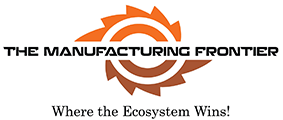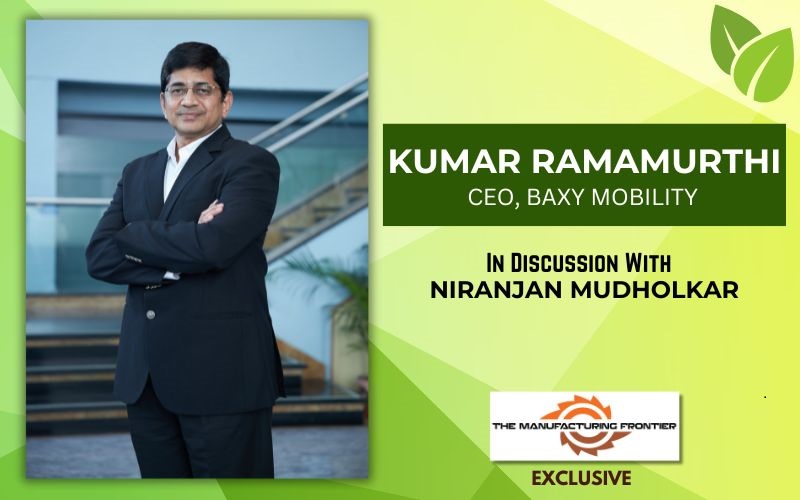“BAXY Mobility is leveraging the digital transformation in the manufacturing sector by integrating advanced technologies such as IoT, AI and data analytics into its processes. This focus allows us to optimize operations, enhance product quality and improve decision-making.” Kumar Ramamurthi, CEO, BAXY Mobility
How would you analyze the Indian three-wheeler market and what differentiation is BAXY Mobility bringing to this rapidly growing industry?
The Indian three-wheeler market is a dynamic and rapidly growing sector, driven by increasing urbanization, rising demand for last-mile connectivity and a strong focus on sustainable transportation solutions. Key trends include a shift toward electric vehicles, Government incentives for green mobility and the adoption of advanced technologies to enhance efficiency and reduce operational costs.
BAXY Mobility differentiates itself by offering innovative, high-quality vehicles tailored to meet diverse customer needs, whether in passenger or cargo segments. With a strong emphasis on sustainability, robust engineering and after-sales service, BAXY Mobility aims to provide superior value, reliability and a seamless ownership experience, setting itself apart in this competitive landscape.
In terms of geographical footprints, which are the key markets where BAXY has a strong presence?
BAXY Mobility is currently established in the Northern, Western and Eastern regions of India. However, this year marks a pivotal moment for the company as we enter the Southern region with a renewed focus. Our strategic plan includes an aggressive network expansion across Southern India, aimed at building a robust presence and solidifying BAXY’s footprint in this region. This initiative aligns with our commitment to ensuring that BAXY Mobility’s products and services are accessible to customers across the entire nation, while enhancing our brand’s reach and support capabilities.
Tell us something about your manufacturing presence and capabilities in India. How are you optimizing the shop floor costs while maintaining high quality standards?
BAXY Mobility currently operates from its state-of-the-art manufacturing facility in Roorkee, Uttarakhand, delivering high-quality products to customers nationwide. As part of our strategic vision, we are exploring opportunities to expand our manufacturing capabilities from this existing plant, with the potential to establish additional facilities in other regions across the country.
Our immediate focus, however, is on strengthening the supply chain base near the Roorkee plant. By optimizing our supply chain operations and establishing local supplier partnerships, we aim to effectively manage inbound logistics costs and maintain an optimal stock of raw materials. This approach is crucial to ensuring the consistent quality of our products, while also improving efficiency and reducing production lead times.
Tell us about BAXY Mobility’s overall product portfolio.
BAXY Mobility offers a diverse product portfolio focused on three-wheeled vehicles, catering to both Internal Combustion Engine (ICE) and Electric Vehicle (EV) segments. Our range includes efficient and reliable ICE three-wheelers, designed for various transportation needs, as well as our EV three-wheelers, designed to prioritize sustainability and eco-friendliness. By combining innovative technology with user-friendly designs, BAXY Mobility aims to provide robust and versatile mobility solutions that meet the demands of modern urban transport.
Are you planning to expand the existing portfolio?
We are excited to announce that BAXY Mobility is expanding its portfolio with the upcoming launch of electric three-wheelers. Our new models will cater to a wide range of consumers, offering various options in terms of cost-effectiveness and mileage. This initiative reflects our commitment to sustainable mobility solutions that meet diverse needs. Stay tuned for more details on our creative EV offerings!
Since you also have a good presence in the 3-wheeler EV space, how would you analyze the maturity of the EV Ecosystem in India at present?
The maturity of the electric vehicle (EV) ecosystem in India can be analyzed across several key dimensions. Firstly, in terms of infrastructure, we are seeing a significant increase in charging stations, though further expansion is needed, especially in rural and semi-urban areas. Secondly, government policies and incentives are playing a crucial role, with initiatives like PM e-DRIVE supporting the industry and promoting consumer adoption.
Additionally, there is a growing acceptance and awareness among consumers regarding the benefits of EVs, although cost parity with ICE vehicles remains a challenge. The 3W segment, in particular, has witnessed rapid growth, driven by both demand for last-mile connectivity and the push for cleaner public transport options.
On the technology front, advancements in battery technology have improved performance and reduced costs, fostering innovation among manufacturers. However, challenges such as limited financing options and concerns around battery lifecycle management persist. Overall, while the Indian EV ecosystem is on a positive trajectory, there is still substantial scope for growth and development before it reaches full stage of maturity.
Supply chain disruptions have become a norm in today’s volatile environment. What is your strategy for staying agile in this scenario?
In the manufacturing industry, operational efficiency and cost control hinge on being strategically located either close to customers or suppliers. At BAXY Mobility, we have adopted a long-term strategy to develop a robust supplier network near our Roorkee facility. This approach not only helps optimize logistics costs but also ensures smoother operations and timely availability of raw materials.
Additionally, we are committed to fostering strong partnerships with our suppliers. As part of this commitment, we actively support our suppliers in enhancing their quality and processes through continuous audits, benchmarking, and collaborative improvements. By prioritizing product quality and aligning our suppliers with our standards, we ensure that the entire supply chain contributes to the excellence of our final products, reinforcing BAXY’s reputation for reliability and quality in the market.
The overall manufacturing sector is experiencing a digital transformation in terms of adoption of advanced technologies. How is BAXY Mobility leveraging this dynamic development to focus on engineering excellence?
BAXY Mobility is leveraging the digital transformation in the manufacturing sector by integrating advanced technologies such as IoT, AI and data analytics into its processes. This focus allows us to optimize operations, enhance product quality and improve decision-making. By embracing innovation and engineering excellence, BAXY Mobility aims to streamline workflows, reduce costs and deliver superior solutions that meet the evolving needs of their clients.
Tell us about your R&D facility in India and about the work that happens here.
At BAXY Mobility, we understand that commercial vehicles are not lifestyle products; but they are livelihood products of our customers. This understanding drives our unwavering commitment in R&D, aimed continuously at enhancing the efficiency and performance of our products.
We place the customer and product at the core of everything we do. This philosophy extends across all our functions and is deeply embedded within our R&D efforts. Our dedicated technical and engineering teams work tirelessly to align with this vision, striving to set new benchmarks in the industry. By focusing on innovative solutions and rigorous development, we aim to ensure our vehicles consistently deliver reliability, efficiency, and value, empowering our customers to run their businesses smoothly and profitably.
On the personal level, you have a very interesting leadership philosophy—Listen, Learn, Leverage, Lead. How did you arrive at it and how has it helped grow both as an individual and as a leader?
As a leader, I believe that effective leadership begins with a strong foundation built on the principles of “Listen – Learn – Leverage – Lead”. I developed this working model to myself through four decades of experience, observing that the leadership is not about position, title and / or power. It is earned with active support and collaboration of the entire team in the ecosystem, both internal and external stakeholders. Generally active listeners embrace diverse perspectives. By prioritizing listening, I foster an environment where team members feel valued and empowered, allowing us to learn collectively from each others’ insights.
Through learning, I continually adapt and grow, ensuring my decisions are well informed and forward looking. Leveraging our team’s strengths along with collective wisdom and available resource is vital. I believe that successful leaders build bridges, connecting talents to opportunities that drive success. Finally, leading means taking decisive action based on these principles, inspiring others to join the journey.
This philosophy has transformed my leadership approach and enhanced my ability to nurture a cohesive and adaptive team culture. As we navigate challenges together, we emerge stronger and more resilient. “Leadership is not about being in charge. It’s about taking care of those in your charge.”

